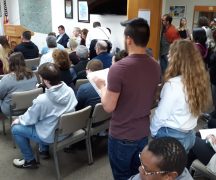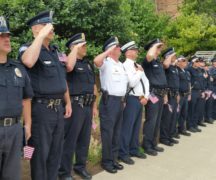By JAN LARSON McLAUGHLIN
BG Independent News
In response to national issues of improper community policing, Ohio developed standards for its police departments.
The first two standards were to be met by March 31, 2017. Both Bowing Green and Bowling Green State University police divisions met those standards of training on use of force, and on complying with proper recruiting, hiring and screening processes.
“Standards are a good thing,” Bowling Green Police Chief Tony Hetrick said during a recent Not In Our Town meeting when the policing standards were discussed. “There are a lot of small agencies that don’t even have policies,” and some large agencies that don’t follow the policies they have, the chief said.
Of the police departments in Ohio, nearly 80 percent are in the process of meeting the state standards.
There are a total of 14 policies set by the state – with three to be met each year from here on. The three to be achieved this year involve community engagement, dispatch training and body cameras. Both the city and campus police engage the community during “Coffee with Cops” events.
Hetrick said police department are not mandated to have body cameras. Bowling Green’s division recently updated its in-car cameras, but doesn’t have the funding for body cameras, he added.
“It’s something I’m open to. I think they are a good thing,” the chief said.
But in addition to the camera expenses, there are also costs for data storage and privacy policies that some police departments are struggling to define.
Hetrick said the in-car cameras have proved valuable in refuting false claims from suspects and in helping with disciplinary action against officers.
To provide body cameras for patrol officers, Hetrick estimated it would cost about $1,000 each – so about $18,000 for just the hardware. Then there would be another $20,000 to $30,000 needed for data storage, the chief said.
If the funds were available, the chief said he would like the police division to be equipped with the body cameras.
Both Hetrick and BGSU Police Chief Mike Campbell were asked if their officers had received training in “implicit bias.”
“Implicit bias was covered in community policing,” Campbell said. The training requirements have increased from just a couple hours, to 14 hours currently, and to be increased to 40 hours by 2020.
“It’s definitely on everybody’s mind,” Campbell said of the training to reduce implicit bias.
Also at the Not In Our Town meeting, member Julie Broadwell spoke about the services offered by the Cocoon for victims of domestic and sexual violence. Help is available 24/7 by calling the crisis hotline at the Link at 419-352-1545.
Staff respond to the hospital, to police stations, to wherever the victims need in Wood County. “Our advocates respond to the scene,” Broadwell said. She also stressed that Cocoon staff are not mandated to report incidents. “Confidentially is big” for many victims, she said.
NIOT members discussed the need to make BGSU student, faculty and staff more aware of the Cocoon services.
On another topic, Rev. Gary Saunders mentioned that with the passage of a “welcoming community” resolution by the city of Bowling Green, efforts may now turn to asking Wood County officials to adopt a similar resolution.





